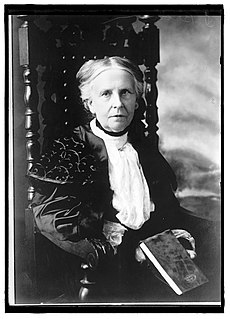A Quote by Russell Kirk
The libertarian thinks that this world is chiefly a stage for the swaggering ego; the conservative finds himself instead a pilgrim in a realm of mystery and wonder, where duty, discipline, and sacrifice are required-and where the reward is that love which passeth all understanding.
Related Quotes
If you punish a child for being naughty, and reward him for being good, he will do right merely for the sake of the reward; and when he goes out into the world and finds that goodness is not always rewarded, nor wickedness always punished, he will grow into a man who only thinks about how he may get on in the world, and does right or wrong according as he finds advantage to himself.
That which is common to the greatest number has the least care bestowed upon it. Every one thinks chiefly of his own, hardly at all of the common interest; and only when he is himself concerned as an individual. For besides other considerations, everybody is more inclined to neglect the duty which he expects another to fulfill.
Kant does not think there is anything wrong with being beneficent from sympathy. He thinks we have a duty to cultivate sympathetic feelings by participating in the situations of others and acquiring an understanding of them. He thinks we also have a duty to make ourselves into the kind of person for whom the recognition that something is our duty would be a sufficient incentive to do it (if no other incentives were available to us). That's what he means by "the duty to act from the motive of duty".
There are only two states of consciousness that exist - the state of the ego and the state of love. The ego is the narrow state, the seed-form, the atomic stage; love is all encompassing, love is God. The center of the ego is I; the ego exists for itself. The nectar of love is the universe. Love exists for all.
We are all musicians in a great human orchestra, and it is now time to play the Save the World Symphony. You are not required to play a solo, but you are required to know what instrument you hold and play it as well as you can. You are required to find your place in the score. What we love we must protect. That’s what love means. From the right to know and the duty to inquire flows the obligation to act.
Remember that it is nothing to do your duty, that is demanded of you and is no more meritorious than to wash your hands when they are dirty; the only thing that counts is the love of duty; when love and duty are one, then grace is in you and you will enjoy a happiness which passes all understanding.
Our German language has a word which in a magnificent way denotes conduct based on this spirit: doing one's duty [Pflichterfüllung]-which means serving the community instead of contenting oneself. We have a word for the basic disposition which underlies conduct of this kind in contrast to egoism and selfishness-idealism. By 'idealism' we mean only the ability of the individual to sacrifice himself for the whole, for his fellow men.





































